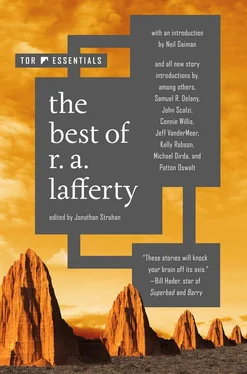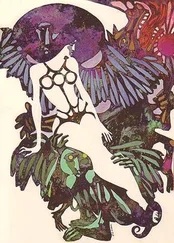“But surely that is not your given name?”
“Audifax,” said five-year-old Fatty.
“Ah well, Audifax, Fatty, are you a kidder too?”
“He’s getting better at it, Mr. Dublin,” Mary Mabel said. “He was a twin till last week. His twin was named Skinny. Mama left Skinny unguarded while she was out tippling, and there were wild dogs in the neighborhood. When Mama got back, do you know what was left of Skinny? Two neck bones and an ankle bone. That was all.”
“Poor Skinny,” Dublin said. “Well, Rampart, this is the fence and the end of my land. Yours is just beyond.”
“Is that ditch on my land?” Rampart asked.
“That ditch is your land.”
“I’ll have it filled in. It’s a dangerous deep cut even if it is narrow. And the other fence looks like a good one, and I sure have a pretty plot of land beyond it.”
“No, Rampart, the land beyond the second fence belongs to Holister Hyde,” Charley Dublin said. “That second fence is the end of your land.”
“Now, just wait a minute, Dublin! There’s something wrong here. My land is one hundred and sixty acres, which would be a half mile on a side. Where’s my half-mile width?”
“Between the two fences.”
“That’s not eight feet.”
“Doesn’t look like it, does it, Rampart? Tell you what—there’s plenty of throwing-sized rocks around. Try to throw one across it.”
“I’m not interested in any such boys’ games,” Rampart exploded. “I want my land.”
But the Rampart children were interested in such games. They got with it with those throwing rocks. They winged them out over the little gully. The stones acted funny. They hung in the air, as it were, and diminished in size. And they were small as pebbles when they dropped down, down into the gully. None of them could throw a stone across that ditch, and they were throwing kids.
“You and your neighbor have conspired to fence open land for your own use,” Rampart charged.
“No such thing, Rampart,” Dublin said cheerfully. “My land checks perfectly. So does Hyde’s. So does yours, if we knew how to check it. It’s like one of those trick topological drawings. It really is half a mile from here to there, but the eye gets lost somewhere. It’s your land. Crawl through the fence and figure it out.”
Rampart crawled through the fence, and drew himself up to jump the gully. Then he hesitated. He got a glimpse of just how deep that gully was. Still, it wasn’t five feet across.
There was a heavy fence post on the ground, designed for use as a corner post. Rampart up-ended it with some effort. Then he shoved it to fall and bridge the gully. But it fell short, and it shouldn’t have. An eight-foot post should bridge a five-foot gully.
The post fell into the gully, and rolled and rolled and rolled. It spun as though it were rolling outward, but it made no progress except vertically. The post came to rest on a ledge of the gully, so close that Rampart could almost reach out and touch it, but it now appeared no bigger than a match stick.
“There is something wrong with that fence post, or with the world, or with my eyes,” Robert Rampart said. “I wish I felt dizzy so I could blame it on that.”
“There’s a little game that I sometimes play with my neighbor Hyde when we’re both out,” Dublin said. “I’ve a heavy rifle and I train it on the middle of his forehead as he stands on the other side of the ditch apparently eight feet away. I fire it off then (I’m a good shot) and I hear it whine across. It’d kill him dead if things were as they seem. But Hyde’s in no danger. The shot always bangs into that little scuff of rocks and boulders about thirty feet below him. I can see it kick up the rock dust there, and the sound of it rattling into those little boulders comes back to me in about two and a half seconds.”
A bull-bat (poor people call it the night-hawk) raveled around in the air and zoomed out over the narrow ditch, but it did not reach the other side. The bird dropped below ground level and could be seen against the background of the other side of the ditch. It grew smaller and hazier as though at a distance of three or four hundred yards. The white bars on its wings could no longer be discerned; then the bird itself could hardly be discerned; but it was far short of the other side of the five-foot ditch.
A man identified by Charley Dublin as the neighbor Hollister Hyde had appeared on the other side of the little ditch. Hyde grinned and waved. He shouted something, but could not be heard.
“Hyde and I both read mouths,” Dublin said, “so we can talk across the ditch easy enough. Which kid wants to play chicken? Hyde will barrel a good-sized rock right at your head, and if you duck or flinch you’re chicken.”
“Me! Me!” Audifax Rampart challenged. And Hyde, a big man with big hands, did barrel a fearsome jagged rock right at the head of the boy. It would have killed him if things had been as they appeared. But the rock diminished to nothing and disappeared into the ditch. Here was a phenomenon: things seemed real-sized on either side of the ditch, but they diminished coming out over the ditch either way.
“Everybody game for it?” Robert Rampart Junior asked.
“We won’t get down there by standing here,” Mary Mabel said.
“Nothing wenchered, nothing gained,” said Cecilia. “I got that from an ad for a sex comedy.”
Then the five Rampart kids ran down into the gully. Ran down is right. It was almost as if they ran down the vertical face of a cliff. They couldn’t do that. The gully was no wider than the stride of the biggest kids. But the gully diminished those children, it ate them alive. They were doll-sized. They were acorn-sized. They were running for minute after minute across a ditch that was only five feet across. They were going, deeper in it, and getting smaller. Robert Rampart was roaring his alarm, and his wife, Nina, was screaming. Then she stopped. “What am I carrying on so loud about?” she asked herself. “It looks like fun. I’ll do it too.”
She plunged into the gully, diminished in size as the children had done, and ran at a pace to carry her a hundred yards away across a gully only five feet wide.
That Robert Rampart stirred things up for a while then. He got the sheriff there, and the highway patrolmen. A ditch had stolen his wife and five children, he said, and maybe had killed them. And if anybody laughs, there may be another killing. He got the colonel of the State National Guard there, and a command post set up. He got a couple of airplane pilots. Robert Rampart had one quality: when he hollered, people came.
He got the newsmen out from T-Town, and the eminent scientists, Dr. Velikof Vonk, Arpad Arkabaranan, and Willy McGilly. That bunch turns up every time you get on a good one. They just happen to be in that part of the country where something interesting is going on.
They attacked the thing from all four sides and the top, and by inner and outer theory. If a thing measures half a mile on each side, and the sides are straight, there just has to be something in the middle of it. They took pictures from the air, and they turned out perfect. They proved that Robert Rampart had the prettiest hundred and sixty acres in the country, the larger part of it being a lush green valley, and all of it being half a mile on a side, and situated just where it should be. They took ground-level photos then, and it showed a beautiful half-mile stretch of land between the boundaries of Charley Dublin and Hollister Hyde. But a man isn’t a camera. None of them could see that beautiful spread with the eyes in their heads. Where was it?
Down in the valley itself everything was normal. It really was half a mile wide and no more than eighty feet deep with a very gentle slope. It was warm and sweet, and beautiful with grass and grain.
Читать дальше




![Рафаэль Лафферти - Дни, полные любви и смерти. Лучшее [сборник litres]](/books/385123/rafael-lafferti-dni-polnye-lyubvi-i-smerti-luchshe-thumb.webp)
![Рафаэль Лафферти - Лучшее [Сборник фантастических рассказов]](/books/401500/rafael-lafferti-luchshee-sbornik-fantasticheskih-ra-thumb.webp)